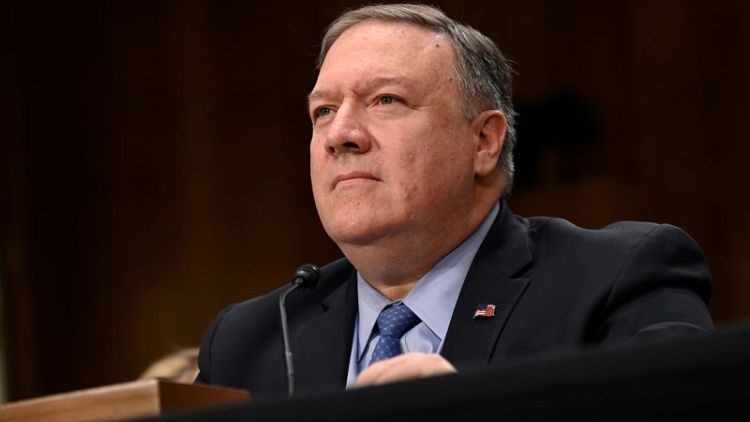SANTIAGO (Reuters) - U.S. Secretary of State Mike Pompeo on Friday began a three-day visit to Chile, Paraguay and Peru, a clutch of fast-growing countries in a region where China's growing presence is a concern for Washington and Venezuela's crisis has escalated.
It will be the first time since 1965 that a U.S. secretary of state has visited Paraguay, a symbolic gesture that experts say underscores U.S. commitment to the region.
Pompeo will also travel on Sunday to Cucuta, a Colombian border city receiving many of the millions of Venezuelan migrants fleeing hunger and violence in their homeland.
Venezuela's political crisis is expected to dominate the trip as the United States pressures President Nicolas Maduro to step down and urges more countries to join the coalition supporting opposition leader Juan Guaido.
"The trip is an opportunity to showcase the transformation that is happening for the great majority of South American nations where like-minded democracies are coming together to solve regional challenges," State Department spokesman Robert Palladino told reporters.
The visit comes as Washington considers more sanctions against Maduro's government and pushes Russia to remove its troops from Venezuela.
Vice President Mike Pence, in an address to the U.N. Security Council on Wednesday, encouraged more countries to join the coalition in support of Guaido. While most Western nations have recognised Guaido as head of state, Russia, China and Cuba have stood by Maduro.
Roberta Braga, a director of the Adrienne Arsht Latin America Centre at the Atlantic Council, said she expected Pompeo to reiterate the importance of Peru's leadership as part of the Lima Group regional bloc in addressing Venezuela's crisis.
"At the top of the priority list for Pompeo’s trip this week will be to continue to reinforce and strengthen the coalition that has been built in support of Guaido," Braga said.
"Pompeo will likely reiterate the administration's prior warnings to external actors, including China, Cuba and Russia, to not intervene in the crisis."
About a quarter of Venezuelans are in need of humanitarian aid, according to the United Nations, with people lacking food, medicine and basic services.
The International Monetary Fund (IMF) said this week Venezuela's economy was expected to contract by one-fourth in 2019, and a further 10 percent in 2020 - a greater collapse than it projected in October.
The Fund said the decline "generates a sizable drag on projected growth for the region and for the emerging
market and developing economy group in both years."
During his travels, Pompeo is expected to highlight the gains from economic and trade cooperation with America, whose regional influence has been increasingly challenged by China.
China, whose demand for raw materials increased during rapid economic growth the past two decades, is already the top trade partner for countries ranging from Brazil, Latin America’s largest economy and the world’s top soybean exporter, to tiny Uruguay.
Latin American countries’ turn to China for financing has alarmed Washington even as its own policy toward the region shifts.
Trump’s December 2017 national security strategy said China was seeking to "pull the region into its orbit through state-led investment and loans."
Chinese foreign direct investment (FDI) in the region has risen by $70 billion since 2012, according to the Adrienne Arsht Latin America Centre. While the United States remains the largest source of FDI, its share fell to 20 percent in 2016 from 25.7 percent in 2015 and 24 percent in 2012, according to the Economic Commission for Latin America and the Caribbean.
(Reporting by Lesley Wroughton in Washington; Editing by James Dalgleish)
